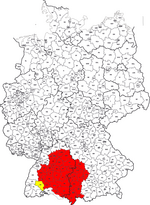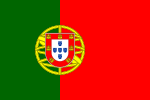The Suebi (also spelled Suavi, Suevi or Suebians) were a large group of Germanic peoples originally from the Elbe river region in what is now Germany...
69 KB (8,883 words) - 14:41, 18 October 2024
The Kingdom of the Suebi (Latin: Regnum Suevorum), also called the Kingdom of Galicia (Latin: Regnum Galicia) or Suebi Kingdom of Galicia (Latin: Galicia...
73 KB (9,362 words) - 17:53, 25 October 2024
5th-century Suebi chieftain; founder of the Agilolfings dynasty...
951 bytes (61 words) - 10:48, 22 August 2023
Tacitus describes the veneration of what he deems as an "Isis" of the Suebi. Due to Tacitus's usage of interpretatio romana elsewhere in the text, his...
5 KB (475 words) - 05:48, 27 March 2024
wanted to restore the Roman order against the hordes of Vandals, Alans and Suebi. The Western Roman Empire fell in 476 AD; therefore, the Visigoths believed...
65 KB (5,812 words) - 10:10, 25 October 2024
historic settlement area of the Germanic tribe alliances named Alemanni and Suebi. This territory would include all of the Alemannic German area, but the...
18 KB (2,085 words) - 06:51, 21 October 2024
Ariovistus was a leader of the Suebi and other allied Germanic peoples in the second quarter of the 1st century BC. He and his followers took part in...
29 KB (4,222 words) - 04:16, 24 October 2024
Hunimund (redirect from Kingdom of the Suebi (Danube))
leader – variously described by Jordanes as dux and as rex – of a group of Suebi. The Suevi fought on the side of Ardaric, king of the Gepids, against the...
4 KB (642 words) - 20:54, 27 August 2024
Suebian knot (category Suebi)
Suebenknoten) is a historical male hairstyle ascribed to the tribe of the Germanic Suebi. The knot is attested by Tacitus in his 1st century AD work Germania, found...
8 KB (875 words) - 21:29, 27 October 2024
During the Middle Ages, the region around Portus Cale became known by the Suebi and Visigoths as Portucale. The name Portucale changed into Portugale during...
232 KB (20,047 words) - 00:29, 10 November 2024







